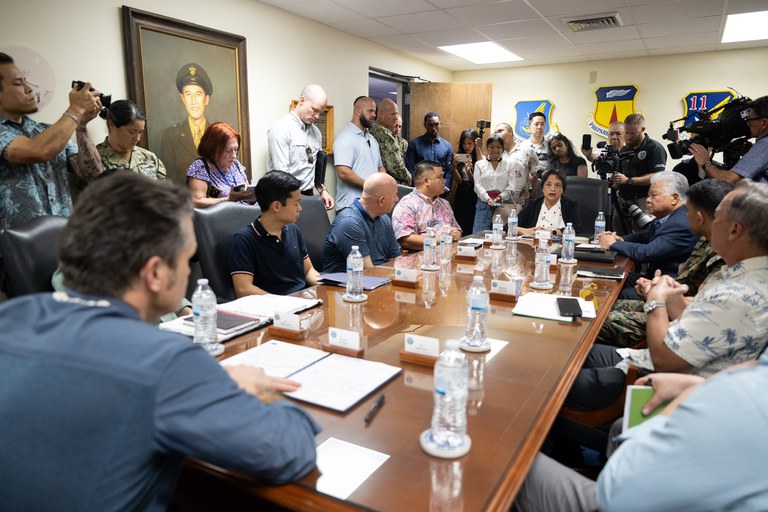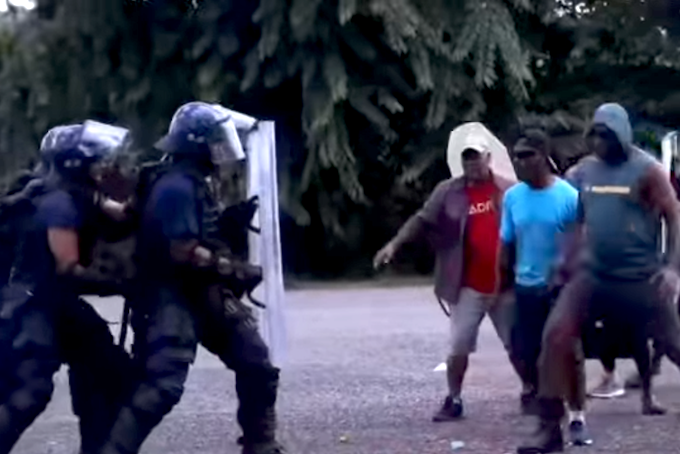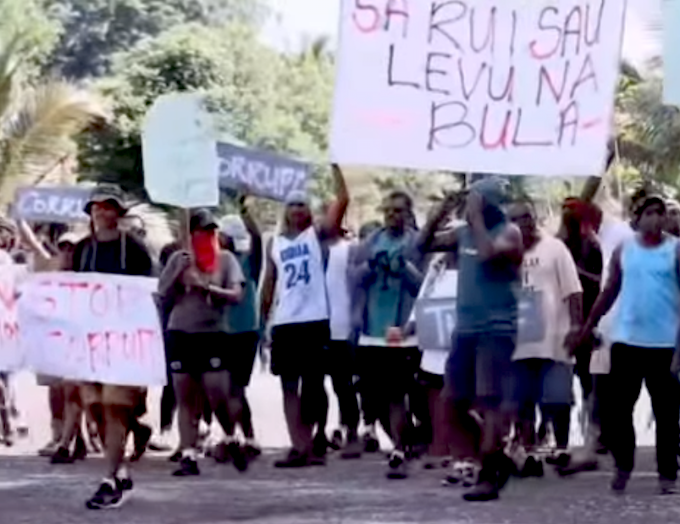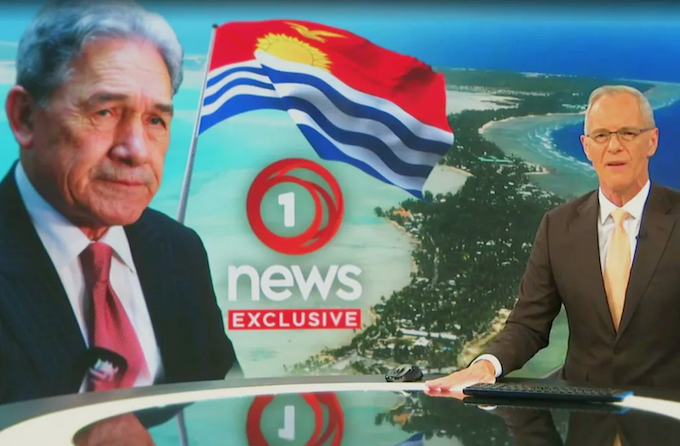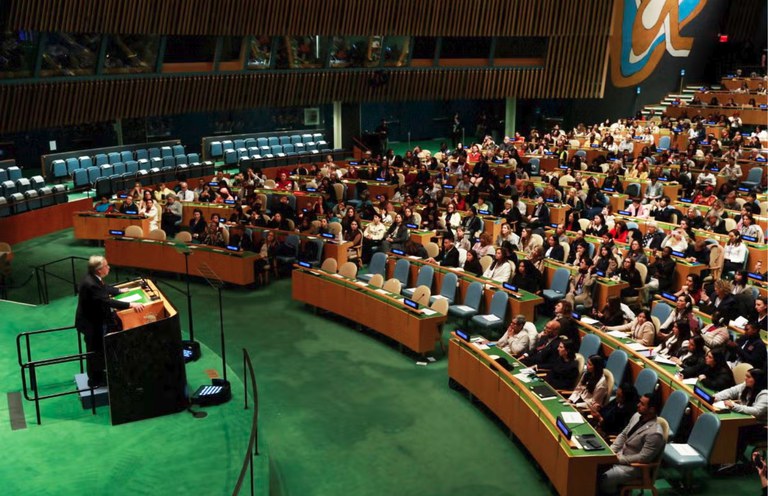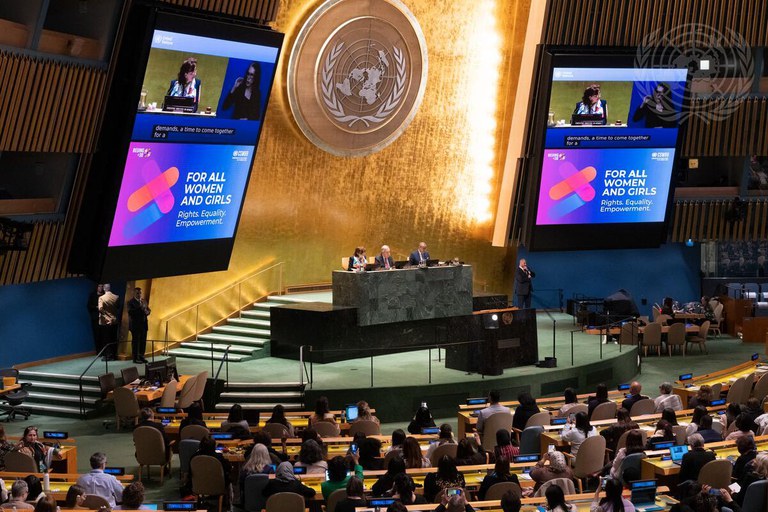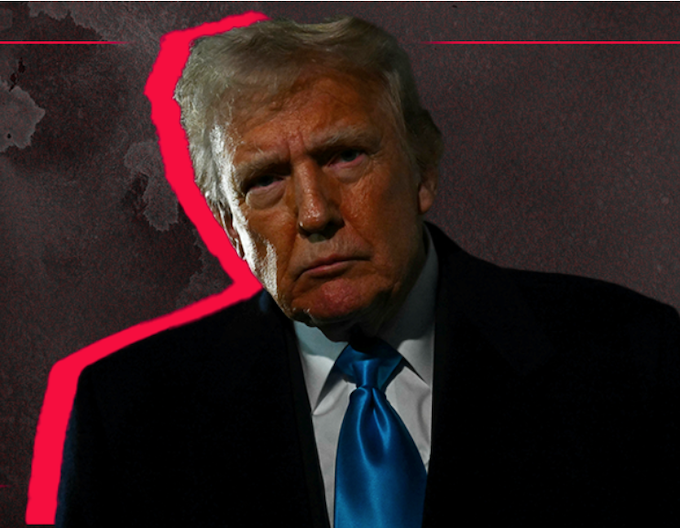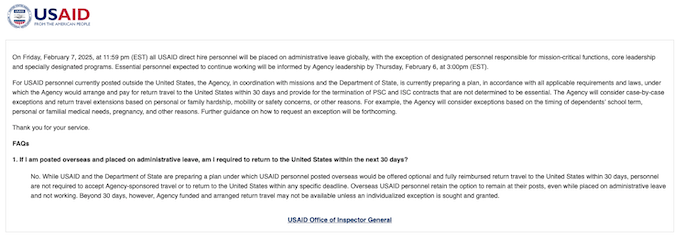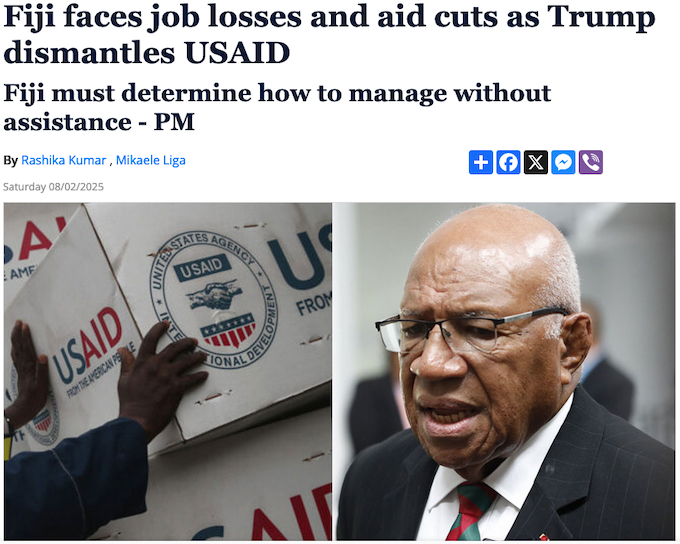By Niko Ratumaimuri in Suva
World Press Freedom Day is not just a celebration of the vital role journalism plays — it is also a moment to reflect on the pressures facing the profession and Pacific governments’ responsibility to protect it.
This was one of the key messages delivered by two guest speakers at The University of the South Pacific (USP) Journalism’s 2025 World Press Freedom Day celebrations this week, the UN Human Rights Adviser for the Pacific, Heike Alefsen, and Fiji Media Association’s general secretary, Stanley Simpson.
In her address to journalism students and other attendees on Monday, chief guest Alefsen emphasised that press freedom is a fundamental pillar of democracy, a human right, and essential for sustainable development and the rule of law.
- READ MORE: PNG’s Gorethy Kenneth: 23 years of fearless journalism and unwavering truth
- Fiji media’s Stan Simpson blasts ‘hypocrites’ in social media clash over press freedom
- Samoa down in RSF media freedom world ranking due to ‘authoritarian pressure’
- Indonesian postcard image ‘dangerous’ but Fiji a rising star in RSF press freedom index
- Fiji media welcomes credible news services, but not ‘pop-up propagandists’, says Simpson
- PINA on World Press Freedom Day – facing new and complex AI challenges
- Rabuka salutes Fiji media but warns against taking freedom for granted
- NZ fares well in latest RSF press freedom index as authoritarian regimes stifle Asia-Pacific media
- RSF 2025 World Press Freedom rankings
- RSF World Press Freedom Index 2025: economic fragility a leading threat to press freedom
“Media freedom is a prerequisite for inclusive, rights-respecting societies,” Alefsen said, warning of rising threats such as censorship, harassment, and surveillance of journalists — especially with the spread of AI tools used to manipulate information and monitor media workers.
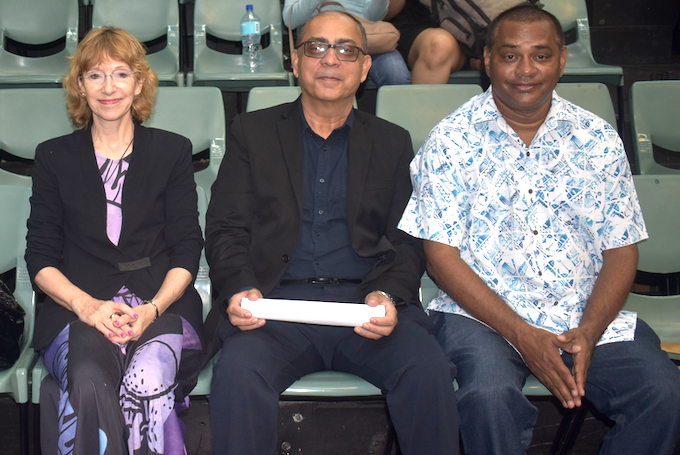
AI and human rights
She stressed that AI must serve human rights — not undermine them — and that it must be used transparently, accountably, and in accordance with international human rights law.
“Some political actors exploit AI to spread disinformation and manipulate narratives for personal or political gain,” she said.
She added that these risks were compounded by the fact that a handful of powerful corporations and individuals now controlled much of the AI infrastructure and influenced the global media environment — able to amplify preferred messages or suppress dissenting voices.
“Innovation cannot come at the expense of press freedom, privacy, or journalist safety,” she said.
Regarding Fiji, Alefsen praised the 2023 repeal of the Media Industry Development Act (MIDA) as a “critical turning point,” noting its positive impact on Fiji’s ranking in the RSF World Press Freedom Index.
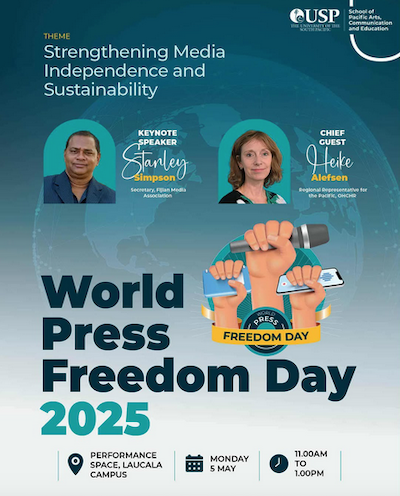
However, she emphasised that legal reforms must continue, especially regarding sedition laws, and she highlighted ongoing challenges across the Pacific, including financial precarity, political pressure, and threats to women journalists.
According to Alefsen, the media landscape in the Pacific was evolving for the better in some countries but concerns remained. She highlighted the working conditions of most journalists in the region, where financial insecurity, political interference, and lack of institutional support were prevalent.
“Independent journalism ensures transparency, combats disinformation, amplifies marginalised voices, and enables people to make informed decisions about their lives and governance. In too many countries around the world, journalists face censorship, detention, and in some cases, death — simply for doing their jobs,” she said.
Strengthening media independence and sustainability
Keynote speaker Stanley Simpson, echoed these concerns, adding that “the era where the Fiji media could survive out of sheer will and guts is over.”
“Now, it’s about technology, sustainability, and mental health support,” he said.
Speaking on the theme, Strengthening Media Independence and Sustainability, Simpson emphasised the need for the media to remain independent, noting that journalists are often expected to make greater sacrifices than professionals in other industries.
“Independence — while difficult and challenging — is a must in the media industry for it to maintain credibility. We must be able to think, speak, write, and report freely on any matter or anyone,” Simpson said.
According to Simpson, there was a misconception in Fiji that being independent meant avoiding relationships or contacts.
“There is a need to build your networks — to access and get information from a wide variety of sources. In fact, strengthening media independence means being able to talk to everyone and hear all sides. Gather all views and present them in a fair, balanced and accurate manner.”
He argued that media could only be sustainable if it was independent — and that independence was only possible if sustainability was achieved. Simpson recalled the events of the 2006 political upheaval, which he said contributed to the decline of media freedom and the collapse of some media organisations in Fiji.
“Today, as we mark World Press Freedom Day, we gather at this great institution to reflect on a simple yet profound truth: media can only be truly sustainable if it is genuinely free.
“We need democratic, political, and governance structures in place, along with a culture of responsible free speech — believed in and practised by our leaders and the people of Fiji,” he said.

The new media landscape
Simpson also spoke about the evolving media landscape, noting the rise of social media influencers and AI generated content. He urged journalists to verify sources and ensure fairness, balance and accuracy — something most social media platforms were not bound by.
While some influencers have been accused of being clickbait-driven, Simpson acknowledged their role. “I think they are important new voices in our democracy and changing landscape,” he said.
He criticised AI-generated news platforms that republished content without editorial oversight, warning that they further eroded public trust in the media.
“Sites are popping up overnight claiming to be news platforms, but their content is just AI-regurgitated media releases,” he said. “This puts the entire credibility of journalism at risk.”
Fiji media challenges
Simpson outlined several challenges facing the Fiji media, including financial constraints, journalist mental health, lack of investment in equipment, low salaries, and staff retention. He emphasised the importance of building strong democratic and governance structures and fostering a culture that respects and values free speech.
“Many fail to appreciate the full scale of the damage to the media industry landscape from the last 16 years. If there had not been a change in government, I believe there would have been no Mai TV, Fiji TV, or a few other local media organisations today. We would not have survived another four years,” he said.
According to Simpson, some media organisations in Fiji were only one or two months away from shutting down.
“We barely survived the last 16 years, while many media organisations in places like New Zealand — TV3’s NewsHub — have already closed down. The era where the Fiji media would survive out of sheer will and guts is over. We need to be more adaptive and respond quickly to changing realities — digital, social media, and artificial intelligence,” he said.

Young journalists respond
During a panel discussion, second-year USP journalism student Vahefonua Tupola of Tonga highlighted the connection between the media and ethical journalism, sharing a personal experience to illustrate his point.
He said that while journalists should enjoy media freedom, they must also apply professional ethics, especially in challenging situations.
Tupola noted that the insights shared by the speakers and fellow students had a profound impact on his perspective.
Another panelist, third-year student and Journalism Students Association president Riya Bhagwan, addressed the intersection of artificial intelligence and journalism.
She said that in this era of rapid technological advancement, responsibility was more critical than ever — with the rise of AI, social media, and a constant stream of information.
“It’s no longer just professional journalists reporting the news — we also have citizen journalism, where members of the public create and share content that can significantly influence public opinion.
“With this shift, responsible journalism becomes essential. Journalists must uphold professional standards, especially in terms of accuracy and credibility,” she said.
The third panelist, second-year student Maniesse Ikuinen-Perman from the Federated States of Micronesia, acknowledged the challenges facing media organisations and journalists in the Pacific.
She shared that young and aspiring journalists like herself were only now beginning to understand the scope of difficulties journalists face in Fiji and across the region.
Maniesse emphasised the importance of not just studying journalism but also putting it into practice after graduation, particularly when returning to work in media organisations in their home countries.
The panel discussion, featuring journalism students responding to keynote addresses, was moderated by USP Journalism head of programme Dr Shailendra Singh.
Dr Singh concluded by noting that while Fiji had made significant progress with the repeal of the Media Industry Development Act (MIDA), global experience demonstrated that media freedom must never be taken for granted.
He stressed that maintaining media freedom was an ongoing struggle and always a work in progress.
“As far as media organisations are concerned, there is always a new challenge on the horizon,” he said, pointing to the complications brought about by digital disruption and, more recently, artificial intelligence.
- Fiji rose four places to 40th (out of 180 nations) in the RSF 2025 World Press Freedom Index to make the country the Oceania media freedom leader outside of Australia (29) and New Zealand (16).
Niko Ratumaimuri is a second-year journalism student at The University of the South Pacific’s Laucala Campus. This article was first published by the student online news site Wansolwara and is republished in collaboration with Asia Pacific Report.
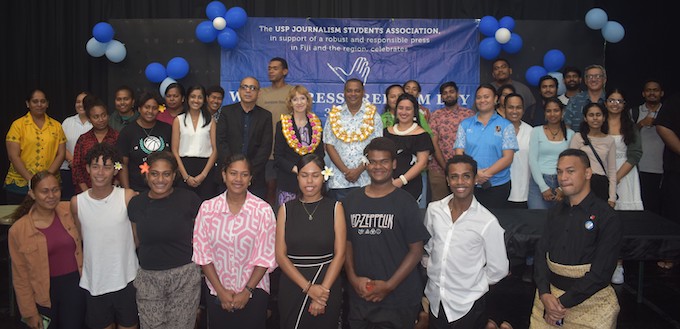
This post was originally published on Asia Pacific Report.
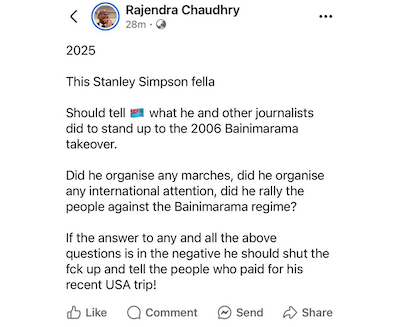
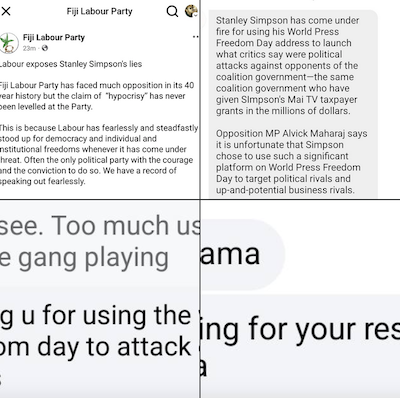
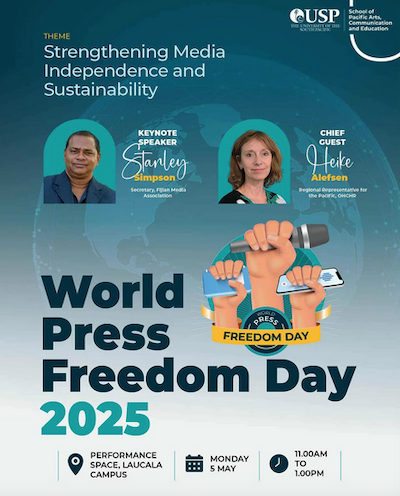
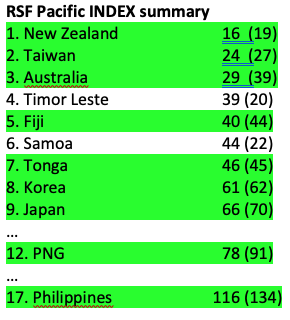
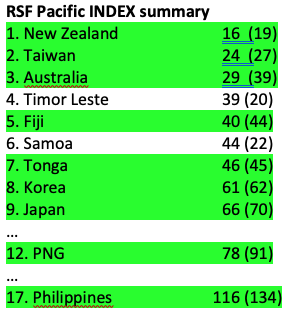

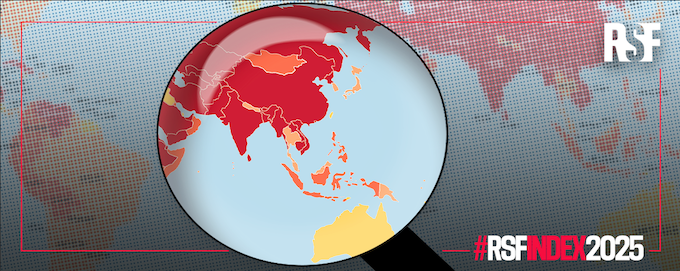
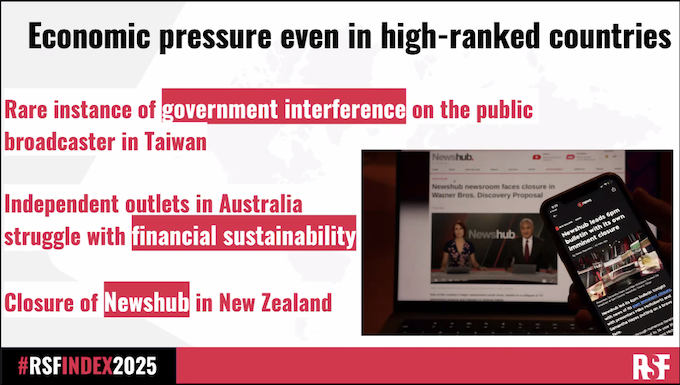
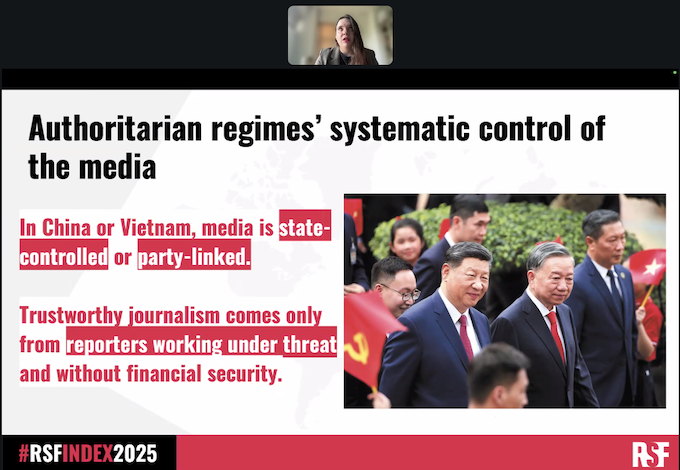


 …
… 


